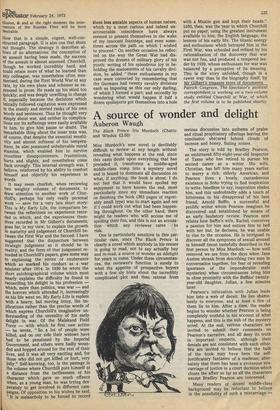A source of wonder and delight
Auberon Waugh
The Black Prince Iris Murdoch (Chatto and Windus £2.50) Miss Murdoch's new novel is devilishly difficult to review at any length without revealing what happens at the end, since this casts doubt upon everything that has preceded it, transforms a middle-aged middle-class romp into a mystery novel and is bound to dominate all discussion on what, if anything, the book is about. I do not feel that it would have spoiled my enjoyment to have known the end, most particularly since my immediate reaction on finishing the book (363 pages of regretably small type) was to start again and see if I could work out what had been happening throughout. On the other hand, there might be readers who will accuse me of spoiling their fun, and this is not an accusa tion which any reviewer cares to risk.
One is particularly sensitive in this particular case, since The Black Prince is clearly a novel which anybody in his senses is going to read, not to say actually buy and re-read, a source of wonder an ddelight for years to come. Under these circumstances, the reviewer's function is surely to whet the appetite of prospective buyers with a few sly hints about the incredibly complicated plot and then retreat from serious discussion into anthems of praise and ritual propitiatory offerings leaving the conclusion obscured behind clouds of incense and honey, fluting noises.
The story is told by Bradley Pearson, an embittered fifty-eight-year-old Inspector of Taxes who has retired to pursue his second career as a writer. His wife, Christian, has left him many years earlier to marry a rich, elderly American, and Pearson lives a lonely, cantankerous existence in Soho trying to find inspiration to write. Needless to say, inspiration eludes him, and this undoubtedly adds a touch of bitterness to his disapproval of his best friend, Arnold Baffin, a successful and prolific writer whom Pearson imagines he discovered and established by means of an early laudatory review. Pearson next relates how Baffin's wife, Rachel, conceives a passion for him and entices him to bed with her but, he declares, he was unable to rise to the occasion. He is intrigued to discover all the symptoms of sexual arousal in himself (most tastefully described in the first person by Miss Murdoch — how well removed we are from the days when Jane Austen shrank from describing two men in conversation together, for fear of revealing ignorance of the imponderable male mysteries) when circumstances bring him in close proximity with the Baffins' twentyyear-old daughter, Julian, a few minutes later.
Pearson's infatuation with Julian leads him into a web of deceit. He lies shamelessly to everyone, and at least a few of them lie to him. After a time, the reader begins to wonder whether Pearson is being completely truthful in his account of what happens, and this is the nub of the mystery novel. At the end, various characters are invited to submit their comments on Pearson's narrative, and all deny its truth in important respects, although their denials are not consistent with each other. We are invited to believe that the bulk of the book may have been the selfjustificatory fantasies of a madman; alternately that there has been a grotesque miscarriage of justice in a court decision which closes the affair so far as all the characters except Bradley Pearson are concerned.
Many readers of decent middle-class background may be reductant to believe in the possibility of such a miscarriage —


































 Previous page
Previous page